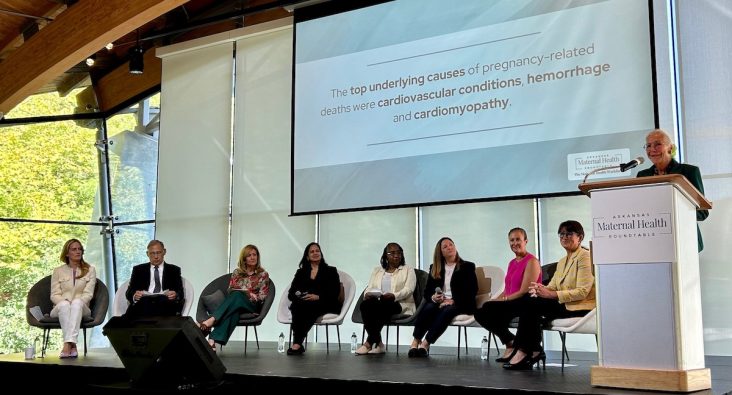Collaboration, non-traditional solutions part of better maternal health
by August 21, 2024 5:24 pm 335 views

Alice Walton, daughter of Walmart founders Helen and Sam Walton and founder of Heartland Whole Health Institute, speaks Wednesday (Aug. 21) during a panel discussion about maternal health.
Improving maternal health outcomes in Arkansas is important to all involved because the state’s mortality rate around birthing a baby is among the highest in the nation and among the worst in developed countries.
“Overall health and wellness has been my focus for some time and that’s why I am here today, As you know Arkansas has among the highest maternal morbidity rate and it is not something to be proud of. It’s going to take all of us working together to create accessibility to lower costs and to produce better outcomes,” said Alice Walton, founder of Heartland Whole Health Institute.
Walton was among around 100 healthcare advocates at the Maternal Health Roundtable held Wednesday (Aug. 21) at Crystal Bridges Museum of American Art. Olivia Walton, CEO and founder of Ingeborg Investments, moderated a panel of those involved in maternal healthcare who are working to improve health outcomes.
The panel included U.S. Sen. John Boozman, R-Ark., Arkansas Secretary of Health Renee Mallory, Dr. Sharmila Makhija, dean and CEO of the Alice L. Walton School of Medicine, Zenobia Harris, executive director of the Arkansas Birthing Project, Lisa Woods, vice president of physical & emotional wellbeing at Walmart, Cara Osborne, senior fellow at Heartland Forward, and Pearl McElfish, director of the University of Arkansas for Medical Sciences’ Institute for Community Health Innovation.
“Arkansas has the highest mother mortality rate and it’s double the national average. That’s just the tip of the iceberg as there are morbidity issues and consequences that are far worse. For every mom who dies, there are 10 times as many who experience severe complications that can have lifelong impacts. … The high morbidity consequences extend beyond families, they impact the workforce, they impact our economy and the wellbeing of our communities overall,” Olivia Walton said.
COLLABORATION AND POLICY
Heartland Forward estimates poor maternal health in Arkansas has a cost of $1.8 billion, and $165 billion nationwide.

“Lots of people want to try and do something, but very few really follow through like the engine propelling this movement,” Boozman said of Olivia Walton, who has been a champion of women’s health empowerment in Arkansas.
Boozman said earlier this year Gov. Sarah Sanders hosted a discussion in Little Rock that looked at the clinical perspective for improving maternal health around training more professionals and medical care workers. He said Wednesday’s discussion is focused on a more comprehensive approach and the need for partnerships to improve maternal and infant health outcomes.
Complicating the issue is that half of all births in Arkansas are Medicaid-funded. Medicaid reimbursements are well below traditional insurance. Medicare is also reimbursing less, Boozman said. The low reimbursement rates mean fewer doctors are taking Medicaid and Medicare patients or limiting the number they take. Mallory said state funding is always tight, but there are programs many people do not know about, meaning education is key to improving access to care.
McElfish said the level of collaboration she has witnessed over the past year to 18 months is having meaningful contributions, with advocates working together to drive better outcomes. She sees educating more doulas who can bridge the gap of healthcare workers as one way to improve access.
“Collaboration, policy and meeting women where they are what I am most excited about as we find real solutions,” McElfish said.
NON-TRADITIONAL SOLUTIONS
Osborne, a nurse and midwife, said there should be a ladder of care that ranges from doulas, licensed midwives, nurses, advanced nurses and physicians. Not everyone has to see a doctor to have a healthy birth, but there is no place in Arkansas where midwives can train, she said.
“Part of the reason we have these sad outcomes is that we have always defaulted to traditional care with doctors and hospitals when doulas and midwives could help provide better prenatal care access in smaller rural communities where travel is required to see a doctor. The system is broken, it is not the people,” Osborne said.
She said Arkansas has to be more creative in finding community-based solutions. Osborne gave McElfish and UAMS an affirmative nod for the doula training program it piloted in 2023 that trained six doulas who served 130 clients. UAMS plans to train at least 80 doulas over the next two years. In 2024, UAMS hosted two doula training sessions with partnering organizations.
Olivia Walton said changing the perception of doulas and midwives among traditional providers is a must.
“It’s not witchery, it’s a real service,” she said.
Makhija said changing the mindset is hard but it can be done. She said doulas and midwives can provide care for healthy women, leaving rural hospital emergency rooms open for emergency care. She said doulas and traditional medical practitioners will still need to use virtual medicine to see more patients given the demand.
The Doula Alliance of Arkansas is a grassroots collaborative dedicated to engagement with state authorities to pass legislation that mandates insurance companies and Medicaid cover doula services. Osborne said lack of compensation is another reason Arkansas does not have enough doulas and midwives. The Alliance and UAMS are working to standardize the six-month training sessions which is a first step in getting them recognized as viable choices.
Woods said Walmart has offered doula care options since 2021. The program was piloted in Georgia where 93 counties have no obstetrics care. It was rolled out nationally last year. Woods said Walmart has for many years offered a program for women that starts with pre-conception and continues through pregnancy and childbirth. She said Walmart provides resources that can be accessed based on need as often as weekly or monthly to fill some of the gaps in traditional coverage. The program also provides resources to cover children up to age two.
Walmart has since changed the program to include virtual health services to help monitor and improve health for mothers and children up to age 17. Woods said Walmart added virtual care access nationwide for its insured employees with no co-pay. She said access to primary care is another way to ensure pregnant women in rural areas have regular conversations with doctors.
